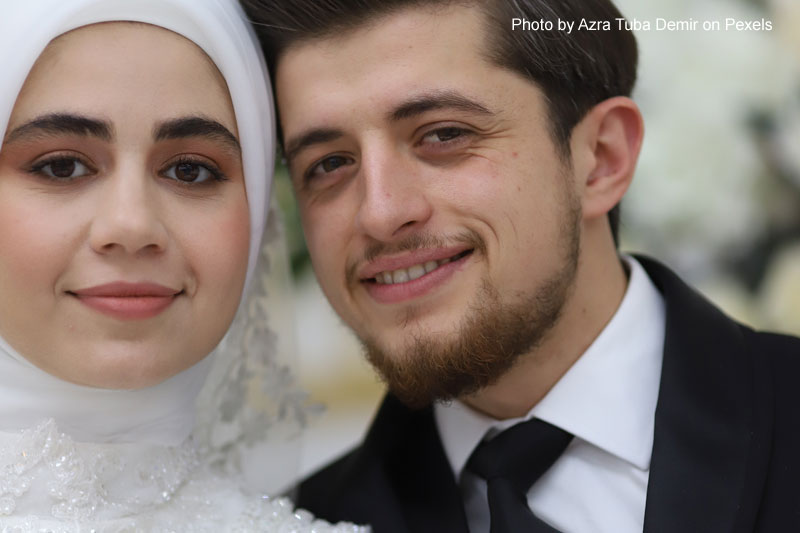All major religions in the world respect the sanctity of marriage, and many have very specific customs and practices to mark these joyous milestones in the lives of practitioners. Like many others, Muslims view wedding vows as sacred and the bond between husband and wife as holy. Their wedding traditions remind the couple of the importance of faith and family throughout every aspect of the ceremony.
A Muslim wedding is called a Nikah, and it generally lasts for three days. These ceremonies are filled with many customs and rituals, including the following wedding traditions central to the ceremony.
- Prayers to Allah: Many Muslim marriages are arranged. Whether the marriage is arranged or not, though, once the couple is committed to the wedding, the religious leaders in the community are informed so that they can begin praying to Allah to consent to the wedding and blessings for the couple. The bride and groom also pray to Allah for guidance and a happy life together.
- Blessing of the bride: It is customary for the groom’s mother to bless the bride to demonstrate acceptance of her into the home and family. The mother often visits the bride’s home with gifts, treats, and a symbolic coin, which is tied to the bride’s wrist. This wedding tradition is intended to make the bride feel welcome in her future family.
- The ring ceremony: This tradition is when the two families make the union publicly known, representing the couple’s official engagement. Both families present gifts to one another during this time.
- Mendhi: Mendhi is a pre-wedding ritual where the bride’s family members adorn her hands and feet with intricate henna designs. Dark-colored henna for the wedding is considered good luck and signifies that the groom’s family will love the bride.
- The groom’s arrival: The groom usually arrives at the wedding in a beautiful car, escorted by family and friends. It is similar to a pre-wedding party as the atmosphere is light and happy.
- The main ceremony: The main ceremony in a Muslim wedding is a solemn affair, which can be very intimate or public. After both parties consent to the marriage by saying “I do” three times, the marriage contract is signed.
- The first verse of the Quran: The first chapter of the Quran is supposed to bring blessings to the couple. The recital of this verse is intimate, usually only including the couple and immediate family. This prayer represents a way to ask Allah for guidance.
- Mehar: Mehar is the dowry offered to the bride’s family during the main ceremony. This dowry symbolizes the groom’s commitment to his new bride.
- Arsi Mushraf: Immediately after Mehar, the new couple will look at one another using a mirror with the Quran between them. For many arranged marriages, this is the first time the couple has seen one another.
- Walimah: Walimah is the after-wedding celebration. It is usually a hearty banquet hosted by the groom’s family. Relatives, family, friends, and neighbors often attend to wish the newlyweds a happy union.
Muslim wedding traditions support the sanctity of a Muslim marriage, focusing on how Allah should be a part of the couple’s new life together and many ways to bless the couple throughout these wedding traditions. These traditions discussed above represent some elements you may encounter when attending a Muslim wedding, which reflects their religion and culture.
Wedding Details is your comprehensive guide to all aspects of your wedding. From traditional ceremonies to questions regarding the guests, our website offers you one place to do all your research.

